Human Flower Project
Toward the Smell of ‘Progress’
Catching us up with Utopia, John Levett revisits Letchworth Garden City, where the movement for ‘town planning’ began a century ago. (Let us know if you laugh or cry.) John lives, writes and gardens in Cambridge, England.
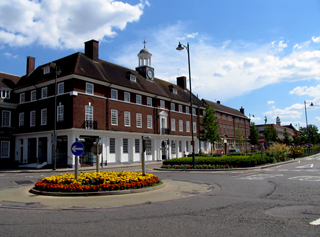
Roundabout in Letchworth Garden City, England
All photos of Letchworth: John Levett
By .(JavaScript must be enabled to view this email address)
When Orwell lived in Wallington in the mid-1930s he passed through it on bus & bike (no doubt on the way to Woolworth’s in Hitchin for roses). He had it in mind in The Road to Wigan Pier when he was writing of socialism, how it drew “with magnetic force every fruit-juice drinker, nudist sandal-wearer, sex-maniac, Quaker, Nature-Cure quack, pacifist and feminist in England.” In Coming Up For Air he wrote: “I knew the type. Vegetarianism, simple life, poetry, nature-worship, roll in the dew before breakfast…They’re all either health-food cranks or else they have something to do with the boy scouts—in either case they’re great ones for Nature and the open air.”
Letchworth Garden City. Full of “vegetarians with wilting beards” & those “who come flocking towards the smell of ‘progress’ like bluebottles to a dead cat.”
But first, some background.
In 1971 I went home, newly qualified to teach, to South London from Liverpool (shortly after Liverpool had lost the FA Cup to an extra-time Charlie George goal in an era when footballers were more interested in the winner of the 4.30 at Haydock Park than they were in suits & hair). In the spirit of the time & of social engineering, I intended to take my qualification to some back street pit of a school close by Surrey Docks or some site of similar cachet, raise the red flag & build Jerusalem. They deserved me. It wasn’t back-street Hanoi, a favela outside Sao Paulo, a project in Santiago but it was on the 47 bus route & had dockers who struck, frequently (I let it pass as unfortunate & indicated a state of false consciousness that these same dockers had come out in mass support of Enoch Powell’s racism three years earlier).
I never got that far. London recruited early & I was late. That summer, on a stiflingly-hot July morning, I arrived at Euston station with two invitations to interview—one in Liverpool & the other in Watford. Watford was thirty minutes away, Liverpool three hours. Watford won. I’d change England there instead. Fade to black.
Six months later I’d moved mum, two cats & a dog to Hitchin in north Hertfordshire. It was cheaper to live, easier to travel & had a garden. Summer of ‘72 Stan Smith won Wimbledon, George McGovern hesitated, the dockers struck & the government bent. I was back in south London on an education course, walking back to the Isle of Dogs to write poetry. It didn’t register that some of the wharves had closed. Soon to come, Surrey Docks to Surrey Quays in a generation; Isle of Dogs to Canary Wharf in another. I went home & bought roses from Jack Harkness up the road.
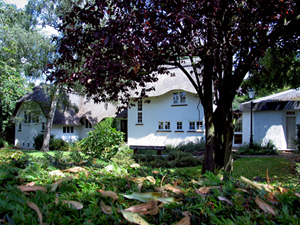 So what’s all this got to do with Letchworth Garden City? Well it’s this…there was a time in teaching (and I’m not making this up!) when you felt that your job involved social change; that education was, above all things, a source of liberation; a way of moving out from the prospect of working down the pit, on the assembly line, behind the shop counter, hedging & ditching; and, you the teacher, provided the armaments to move on out & move on up. Education & its prospects was part of the ‘New Jerusalemism’ (to use Corelli Barnett’s phrase) that permeated British social policy in the immediate post-war years. Being one of those post-war people I was going to do the changing & do it in the places that promised little. In some ways it was patronising & smacked of middle-class benevolence “flocking towards the smell of ‘progress’ like bluebottles to a dead cat.” And I’d finished up in Hertfordshire, home to New Towns (Stevenage, Hemel, Hatfield) & Garden Cities (Letchworth, Welwyn). In my frame of mind there was something ‘heroic’ in them fashioning lives away from slum, pollution, war devastation, over-crowding, resource poverty—starting again how we should have started had we thought.
So what’s all this got to do with Letchworth Garden City? Well it’s this…there was a time in teaching (and I’m not making this up!) when you felt that your job involved social change; that education was, above all things, a source of liberation; a way of moving out from the prospect of working down the pit, on the assembly line, behind the shop counter, hedging & ditching; and, you the teacher, provided the armaments to move on out & move on up. Education & its prospects was part of the ‘New Jerusalemism’ (to use Corelli Barnett’s phrase) that permeated British social policy in the immediate post-war years. Being one of those post-war people I was going to do the changing & do it in the places that promised little. In some ways it was patronising & smacked of middle-class benevolence “flocking towards the smell of ‘progress’ like bluebottles to a dead cat.” And I’d finished up in Hertfordshire, home to New Towns (Stevenage, Hemel, Hatfield) & Garden Cities (Letchworth, Welwyn). In my frame of mind there was something ‘heroic’ in them fashioning lives away from slum, pollution, war devastation, over-crowding, resource poverty—starting again how we should have started had we thought.
In 1898 Ebenezer Howard wrote Tomorrow: a peaceful path to real reform & a year later founded the Town & Country Planning Association. In 1903 a plot was purchased outside Hitchin & in fast-as-reasonable time competitions for cheap housing run, architects appointed, zones of activity allocated, agricultural green belts protected, railway station built, excursions from London organized & vegetarian cycling clubs put in place. Industry was separated from housing, pubs frowned upon, manufactories for corsets, fire-engines & dustcarts attracted, traffic roundabouts emplaced. Land would be held in common & lease rents ploughed back for the public good. You can see the attraction. New century, new start. No war yet.
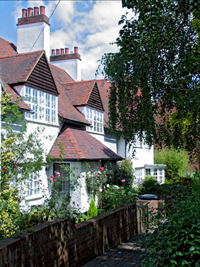 When I lived in Hitchin I often bussed over to Letchworth somehow expecting the stuff of history & progressive vision to seep upwards through the soles of my shoes & permeate me with utopian endeavour. I went back a week ago. Not to get the same but to kick off some dust from my soul.
When I lived in Hitchin I often bussed over to Letchworth somehow expecting the stuff of history & progressive vision to seep upwards through the soles of my shoes & permeate me with utopian endeavour. I went back a week ago. Not to get the same but to kick off some dust from my soul.
Nothing had changed, so it seemed. Sure there were different shops, some new buildings; eateries reflected a different Britain & clothes a different convention. But…the model shop still with its ‘50s façade; the summer-bedded roundabouts; the high-street cottages backing-off behind privet; the villas in styles nodding towards Shaw, Webb & Voysey; the freshly-matted-and-glossed ‘20s & 30s social housing with neat hedges & hollyhocks. Always hollyhocks. Then the stolid library & town hall (1930s-built, sure that the ‘experiment’ now had its foundations & early maturity); Councillor Charles Francis Ball’s memorial garden (with the stone plinth of Sappho’s recently-nicked statue bizarrely in the background); the Methodist hall & its Polish luncheon club; the Broadway gardens once dedicated to Jack Kennedy but re-dedicated in 2003 in commemoration of its own centenary (presumably JFK didn’t measure up posthumously to his living promise); David’s Bookshop, who twenty years ago bought my book collection.
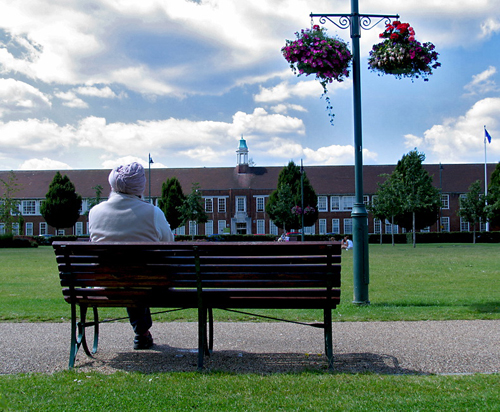
And the people. ‘A cut-price crowd’ Larkin might have thought (Betjeman wrote about Letchworth; Larkin wouldn’t have gone near it) & ‘urban yet simple’ seemed to fit. I began to notice what wasn’t there—no graffiti, no junk, no mess of rubbish, no drunks, no louts, no kids-on-bikes-on-pavements. No threat. Maybe it was the time of day but each person on the street seemed to be playing the role of person-in-a-garden-city; not much to do, no buzz, no edge. It has its tourist centre now; it has features. Nothing much happens. The words ‘bland’ & ‘smug’ came to mind but then again maybe the picture in Howard’s head had worked. It seemed to me to be a community that was getting on with itself; not as isolated on all sides as originally but sufficiently detached to feel different; maybe ‘dwelling where only salesmen and relations come’ (Larkin again) but none had that look of desperation and anywhere-but-here that I register in new towns of post-war vintage.
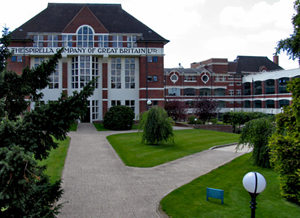 I walked away north past the old Spirella corset factory (corporate offices now) & across the wheatfields towards Hitchin. At the fag-end of a sad, spitting month the sky was cloudless. “Such a day it is when time piles up the hills like pumpkins, and the stream runs golden” wrote Laurie Lee sometime during a war. I walked past the fields that used to be Jack Harkness’s; all gone to corn now. Down on into Ickleford & sat under a tree in the churchyard thinking of Letchworth. Open-air Shakespeare in Howard Park this evening? Morris antics in Broadway Gardens? Fresh-pressed cider at the vegetarian stall served by a smocked Esperanto-spouter? Auras detected & primal dances at the Edward Carpenter commemorative barn?
I walked away north past the old Spirella corset factory (corporate offices now) & across the wheatfields towards Hitchin. At the fag-end of a sad, spitting month the sky was cloudless. “Such a day it is when time piles up the hills like pumpkins, and the stream runs golden” wrote Laurie Lee sometime during a war. I walked past the fields that used to be Jack Harkness’s; all gone to corn now. Down on into Ickleford & sat under a tree in the churchyard thinking of Letchworth. Open-air Shakespeare in Howard Park this evening? Morris antics in Broadway Gardens? Fresh-pressed cider at the vegetarian stall served by a smocked Esperanto-spouter? Auras detected & primal dances at the Edward Carpenter commemorative barn?
I strolled on, stopped at my once-home & thence around the town where I lived the happiest & the darkest times of my life. As I walked I dwelt within the times & knew that I was done with them & doubted I’d come back. When I arrived in 1972 it was at the tail-end of being a small market-town grown slightly prosperous with the coming of the railway. Its shops were in the family & they still delivered to the door in their own vans; the book seller still published subscriber editions & teashops received their Indian & Ceylon in wood chests. Now Starbucks. I left for the station. Sorted.


I was born in Letchworth Garden City and lived in this beautiful place until I was 13. I loved the whole idea of a town that had wide pavements, lots of trees and access to parks and fields and villages. It was also a ‘dry’ town (until 1962) so no alcohol could be sold.
Obviously, I see the town from a very different perspective from John who went there when it was becoming very ordinary indeed. However, I think it’s worth noting that someonewho is obsessed with daisies as cultural signifiers was born AND bred there; and that it was also home to the creator of the
Gaia project (and DaisyWorld), James Lovelock. What does this tell you about Letchworth?
I revere the people who created the Garden City. It was a WONDERFUL place to grow up in, and I owe it so much.Free thinking, nature-loving, beautiful architecture, intelligent planning… I love going back there on my trips to the UK from Australia, and I would quite like to end my days there.
And the Sappho statue! How many towns had a statue of a Lesbian in the town gardens, with her lyre. She was beautiful, and never defaced. She was a much loved Letchworth citizen until,one dark day, a lesbian magazine did an article about her. The next week she was gone. Sometimes no publicity is
best.
Keith Howes
Sydney, Australia